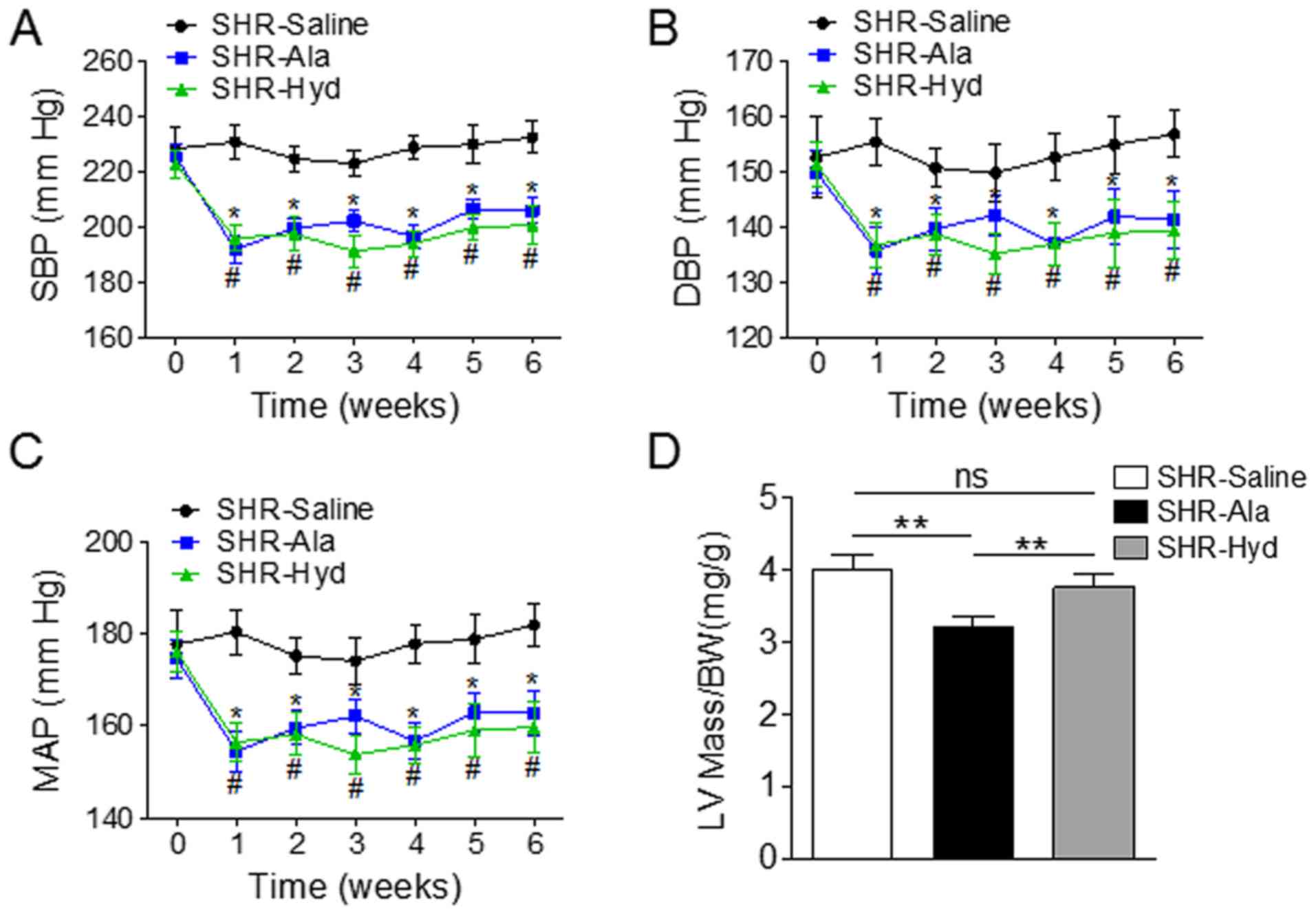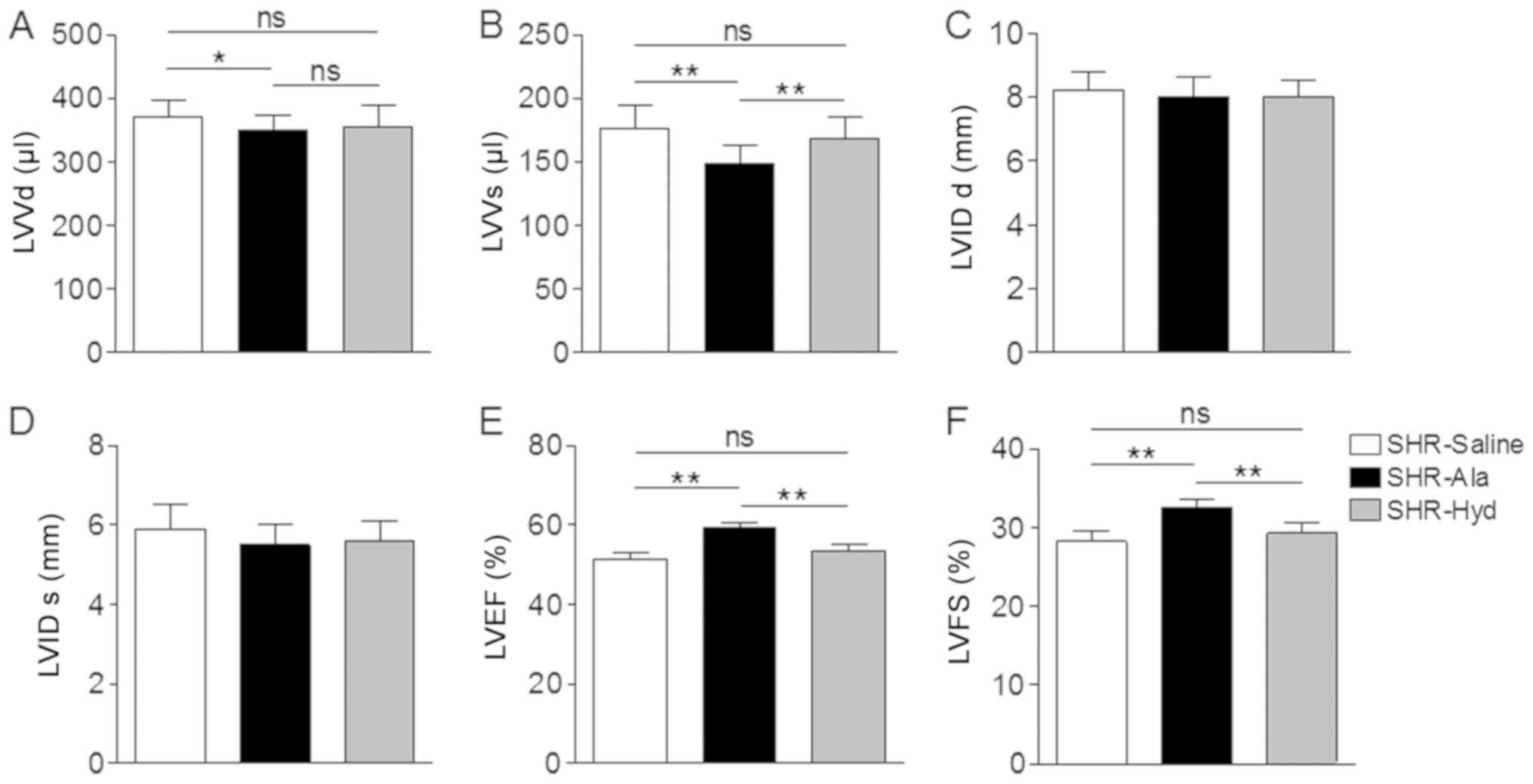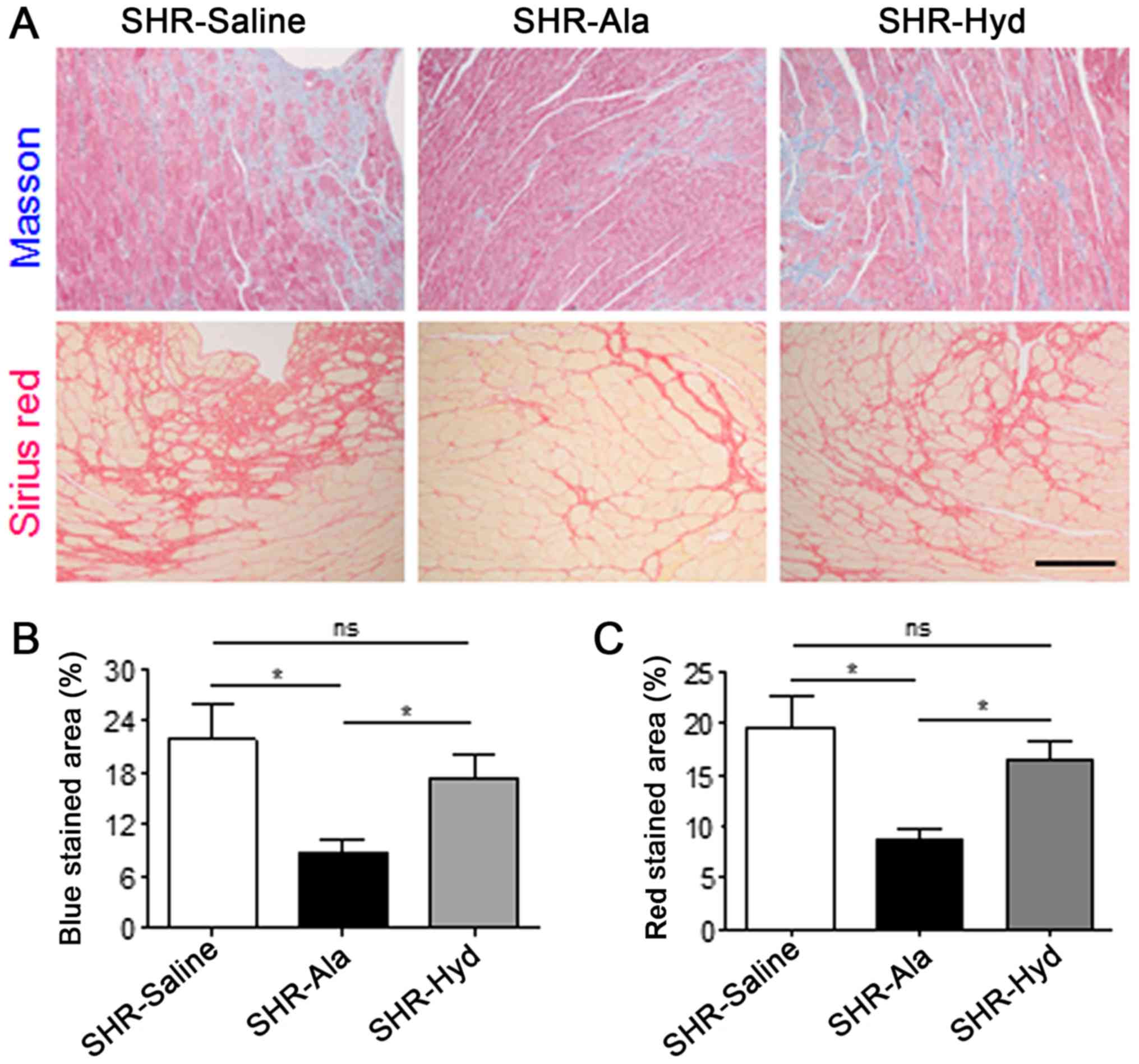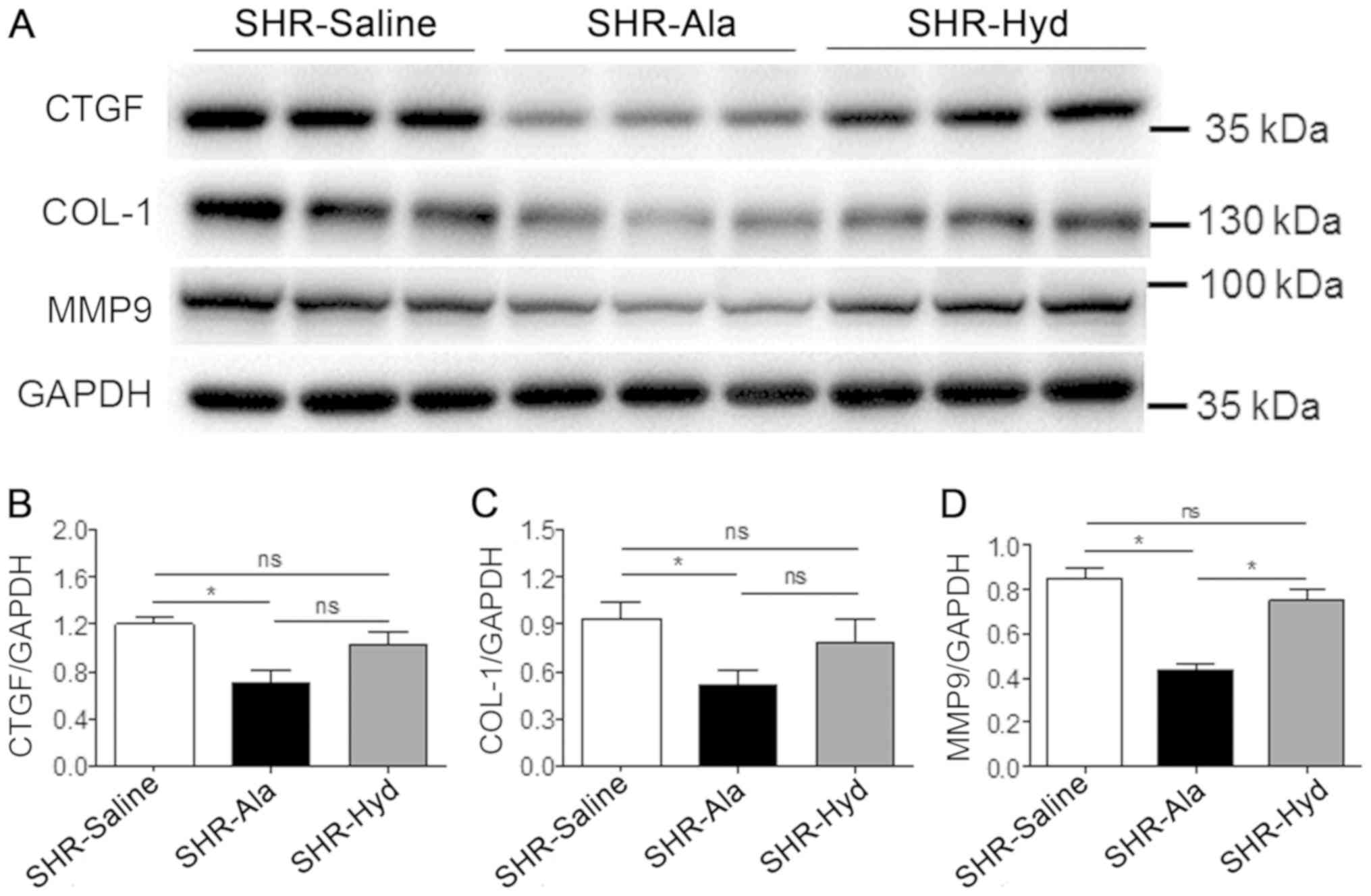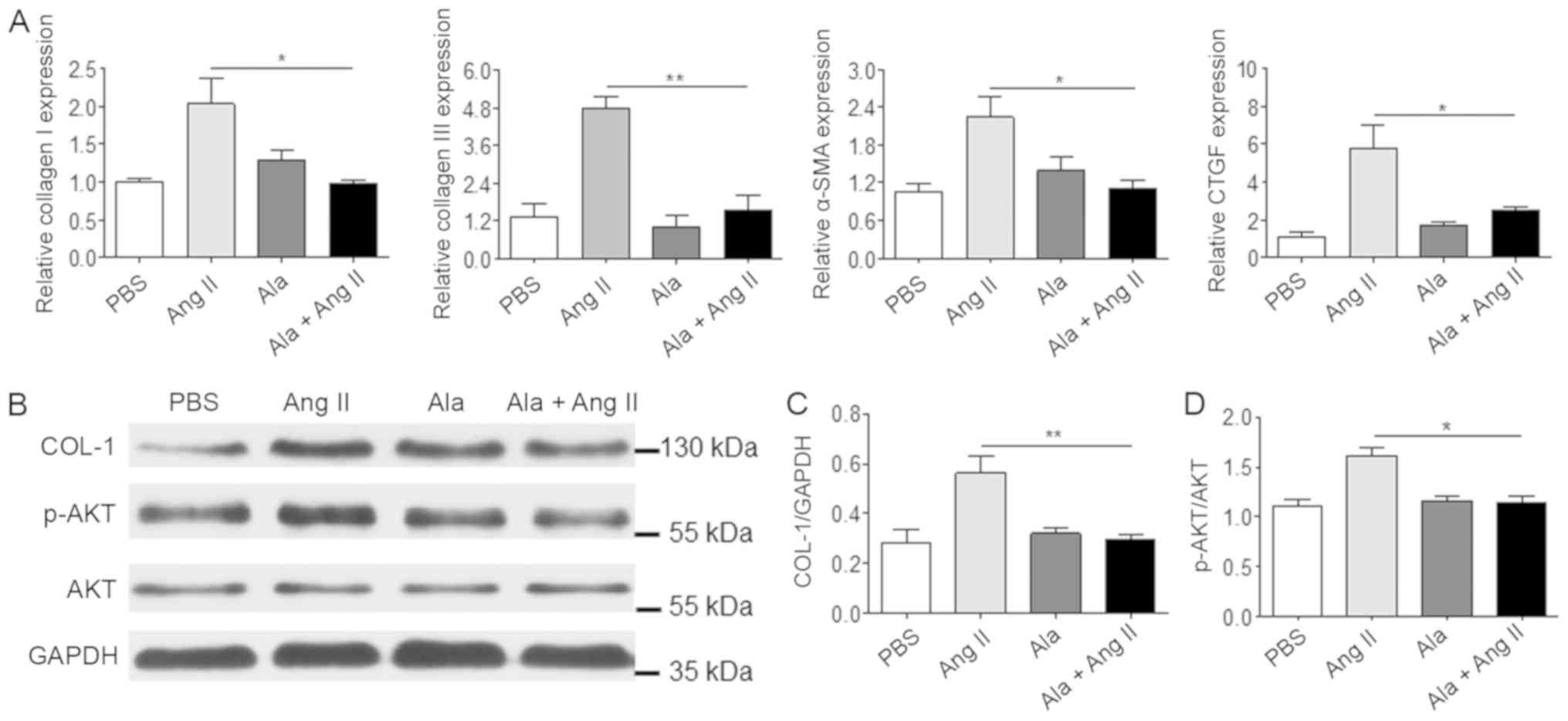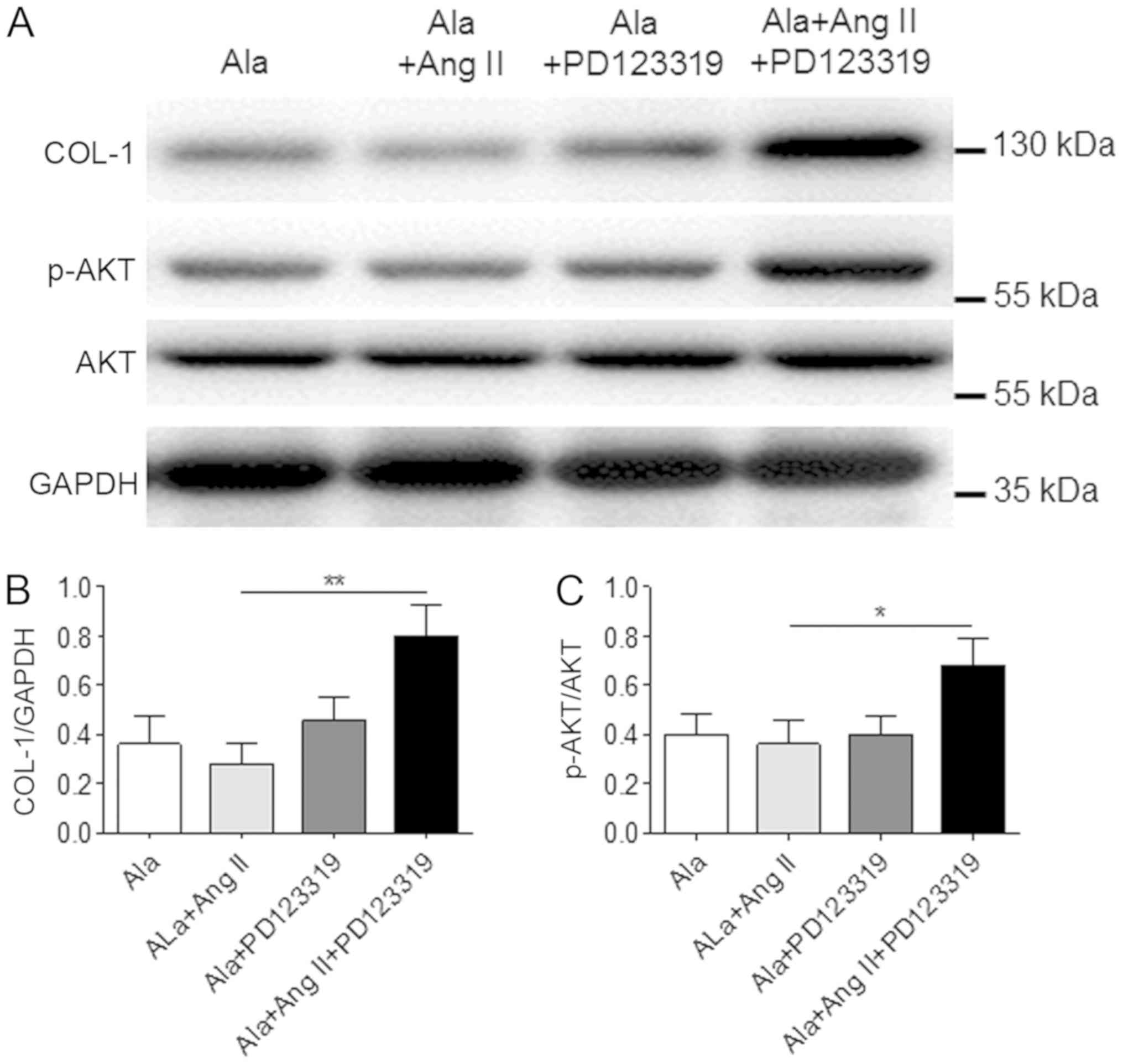|
1
|
Fujiu K and Nagai R: Fibroblast-mediated
pathways in cardiac hypertrophy. J Mol Cell Cardiol. 70:64–73.
2014. View Article : Google Scholar : PubMed/NCBI
|
|
2
|
Weber KT and Brilla CG: Pathological
hypertrophy and cardiac interstitium. Fibrosis and
renin-angiotensin-aldosterone system. Circulation. 83:1849–1865.
1991. View Article : Google Scholar : PubMed/NCBI
|
|
3
|
Young MJ and Funder JW: The
renin-angiotensin-aldosterone system in experimental
mineralocorticoid-salt-induced cardiac fibrosis. Am J Physiol.
271:E883–E888. 1996.PubMed/NCBI
|
|
4
|
MacKenna D, Summerour SR and Villarreal
FJ: Role of mechanical factors in modulating cardiac fibroblast
function and extracellular matrix synthesis. Cardiovasc Res.
46:257–263. 2000. View Article : Google Scholar : PubMed/NCBI
|
|
5
|
Davis J and Molkentin JD: Myofibroblasts:
Trust your heart and let fate decide. J Mol Cell Cardiol. 70:9–18.
2014. View Article : Google Scholar : PubMed/NCBI
|
|
6
|
Bader M, Peters J, Baltatu O, Muller DN,
Luft FC and Ganten D: Tissue renin-angiotensin systems: New
insights from experimental animal models in hypertension research.
J Mol Med (Berl). 79:76–102. 2001. View Article : Google Scholar : PubMed/NCBI
|
|
7
|
Ruiz-Ortega M, Lorenzo O, Rupérez M,
Esteban V, Suzuki Y, Mezzano S, Plaza JJ and Egido J: Role of the
renin-angiotensin system in vascular diseases: Expanding the field.
Hypertension. 38:1382–1387. 2001. View Article : Google Scholar : PubMed/NCBI
|
|
8
|
Villarreal FJ, Kim NN, Ungab GD, Printz MP
and Dillmann WH: Identification of functional angiotensin II
receptors on rat cardiac fibroblasts. Circulation. 88:2849–2861.
1993. View Article : Google Scholar : PubMed/NCBI
|
|
9
|
Kim S, Ohta K, Hamaguchi A, Yukimura T,
Miura K and Iwao H: Angiotensin II induces cardiac phenotypic
modulation and remodeling in vivo in rats. Hypertension.
25:1252–1259. 1995. View Article : Google Scholar : PubMed/NCBI
|
|
10
|
Kawano H, Do YS, Kawano Y, Starnes V, Barr
M, Law RE and Hsueh WA: Angiotensin II has multiple profibrotic
effects in human cardiac fibroblasts. Circulation. 101:1130–1137.
2000. View Article : Google Scholar : PubMed/NCBI
|
|
11
|
González A, López B, Querejeta R and Diez
J: Regulation of myocardial fibrillar collagen by angiotensin II. A
role in hypertensive heart disease? J Mol Cell Cardiol.
34:1585–1593. 2002. View Article : Google Scholar : PubMed/NCBI
|
|
12
|
Simko F, Pechanova O, Pelouch V,
Krajcirovicova K, Mullerova M, Bednarova K, Adamcova M and Paulis
L: Effect of melatonin, captopril, spironolactone and simvastatin
on blood pressure and left ventricular remodelling in spontaneously
hypertensive rats. J Hypertens. (Suppl 27):S5–S10. 2009. View Article : Google Scholar
|
|
13
|
Lautner RQ, Villela DC, Fraga-Silva RA,
Silva N, Verano-Braga T, Costa-Fraga F, Jankowski J, Jankowski V,
Sousa F, Alzamora A, et al: Discovery and characterization of
alamandine: A novel component of the renin-angiotensin system. Circ
Res. 112:1104–1111. 2013. View Article : Google Scholar : PubMed/NCBI
|
|
14
|
Habiyakare B, Alsaadon H, Mathai ML, Hayes
A and Zulli A: Reduction of angiotensin A and alamandine
vasoactivity in the rabbit model of atherogenesis: Differential
effects of alamandine and Ang(1–7). Int J Exp Pathol. 95:290–295.
2014. View Article : Google Scholar : PubMed/NCBI
|
|
15
|
Livak KJ and Schmittgen TD: Analysis of
relative gene expression data using real-time quantitative PCR and
the 2(-Delta Delta C(T)) method. Methods. 25:402–408. 2001.
View Article : Google Scholar : PubMed/NCBI
|
|
16
|
Soares ER, Barbosa CM, Campagnole-Santos
MJ, Santos RAS and Alzamora AC: Hypotensive effect induced by
microinjection of Alamandine, a derivative of angiotensin-(1–7),
into caudal ventrolateral medulla of 2K1C hypertensive rats.
Peptides. 96:67–75. 2017. View Article : Google Scholar : PubMed/NCBI
|
|
17
|
Jankowski V, Vanholder R, van der Giet M,
Tölle M, Karadogan S, Gobom J, Furkert J, Oksche A, Krause E, Tran
TN, et al: Mass-spectrometric identification of a novel angiotensin
peptide in human plasma. Arterioscler Thromb Vasc Biol. 27:297–302.
2007. View Article : Google Scholar : PubMed/NCBI
|
|
18
|
Shinohara T, Harada M, Ogi K, Maruyama M,
Fujii R, Tanaka H, Fukusumi S, Komatsu H, Hosoya M, Noguchi Y, et
al: Identification of a G protein-coupled receptor specifically
responsive to beta-alanine. J Biol Chem. 279:23559–23564. 2004.
View Article : Google Scholar : PubMed/NCBI
|
|
19
|
Yang R, Smolders I, Vanderheyden P,
Demaegdt H, Van Eeckhaut A, Vauquelin G, Lukaszuk A, Tourwé D, Chai
SY, Albiston AL, et al: Pressor and renal hemodynamic effects of
the novel angiotensin A peptide are angiotensin II type 1A receptor
dependent. Hypertension. 57:956–964. 2011. View Article : Google Scholar : PubMed/NCBI
|
|
20
|
Coutinho DC, Foureaux G, Rodrigues KD,
Salles RL, Moraes PL, Murça TM, De Maria ML, Gomes ER, Santos RA,
Guatimosim S and Ferreira AJ: Cardiovascular effects of angiotensin
A: A novel peptide of the renin-angiotensin system. J Renin
Angiotensin Aldosterone Syst. 15:480–486. 2014. View Article : Google Scholar : PubMed/NCBI
|
|
21
|
Qaradakhi T, Apostolopoulos V and Zulli A:
Angiotensin (1–7) and Alamandine: Similarities and differences.
Pharmacol Res. 111:820–826. 2016. View Article : Google Scholar : PubMed/NCBI
|
|
22
|
Sun Y, Ramires FJ, Zhou G, Ganjam VK and
Weber KT: Fibrous tissue and angiotensin II. J Mol Cell Cardiol.
29:2001–2012. 1997. View Article : Google Scholar : PubMed/NCBI
|
|
23
|
Varo N, Etayo JC, Zalba G, Beaumont J,
Iraburu MJ, Montiel C, Gil MJ, Monreal I and Díez J: Losartan
inhibits the post-transcriptional synthesis of collagen type I and
reverses left ventricular fibrosis in spontaneously hypertensive
rats. J Hypertens. 17:107–114. 1999. View Article : Google Scholar : PubMed/NCBI
|
|
24
|
Brown L, Duce B, Miric G and Sernia C:
Reversal of cardiac fibrosis in deoxycorticosterone acetate-salt
hypertensive rats by inhibition of the renin-angiotensin system. J
Am Soc Nephrol. 10 (Suppl 11):S143–S148. 1999.PubMed/NCBI
|
|
25
|
Crawford DC, Chobanian AV and Brecher P:
Angiotensin II induces fibronectin expression associated with
cardiac fibrosis in the rat. Circ Res. 74:727–739. 1994. View Article : Google Scholar : PubMed/NCBI
|
|
26
|
Athyros VG, Mikhailidis DP, Kakafika AI,
Tziomalos K and Karagiannis A: Angiotensin II reactivation and
aldosterone escape phenomena in renin-angiotensin-aldosterone
system blockade: Is oral renin inhibition the solution? Expert Opin
Pharmacother. 8:529–535. 2007. View Article : Google Scholar : PubMed/NCBI
|
|
27
|
Zhao QD, Viswanadhapalli S, Williams P,
Shi Q, Tan C, Yi X, Bhandari B and Abboud HE: NADPH oxidase 4
induces cardiac fibrosis and hypertrophy through activating
Akt/mTOR and NFkB signaling pathways. Circulation. 131:643–655.
2015. View Article : Google Scholar : PubMed/NCBI
|
|
28
|
Lin CY, Hsu YJ, Hsu SC, Chen Y, Lee HS,
Lin SH, Huang SM, Tsai CS and Shih CC: CB1 cannabinoid receptor
antagonist attenuates left ventricular hypertrophy and Akt-mediated
cardiac fibrosis in experimental uremia. J Mol Cell Cardiol.
85:249–261. 2015. View Article : Google Scholar : PubMed/NCBI
|
|
29
|
Tian B, Liu J, Bitterman P and Bache RJ:
Angiotensin II modulates nitric oxide-induced cardiac fibroblast
apoptosis by activation of AKT/PKB. Am J Physiol Heart Circ
Physiol. 285:H1105–1112. 2003. View Article : Google Scholar : PubMed/NCBI
|
|
30
|
Arumugam S, Sreedhar R, Thandavarayan RA,
Karuppagounder V, Krishnamurthy P, Suzuki K, Nakamura M and
Watanabe K: Angiotensin receptor blockers: Focus on cardiac and
renal injury. Trends Cardiovasc Med. 26:221–228. 2016. View Article : Google Scholar : PubMed/NCBI
|
|
31
|
Zulli A, Hare DL, Buxton BF and Widdop RE:
Vasoactive role for angiotensin II type 2 receptors in human radial
artery. Int J Immunopathol Pharmacol. 27:79–85. 2014. View Article : Google Scholar : PubMed/NCBI
|
|
32
|
Dong X, Han S, Zylka MJ, Simon MI and
Anderson DJ: A diverse family of GPCRs expressed in specific
subsets of nociceptive sensory neurons. Cell. 106:619–632. 2001.
View Article : Google Scholar : PubMed/NCBI
|
|
33
|
Lembo PM, Grazzini E, Groblewski T,
O'Donnell D, Roy MO, Zhang J, Hoffert C, Cao J, Schmidt R,
Pelletier M, et al: Proenkephalin A gene products activate a new
family of sensory neuron-specific GPCRs. Nat Neurosci. 5:201–209.
2002. View Article : Google Scholar : PubMed/NCBI
|
|
34
|
Nishimura S, Uno M, Kaneta Y, Fukuchi K,
Nishigohri H, Hasegawa J, Komori H, Takeda S, Enomoto K, Nara F and
Agatsuma T: MRGD, a MAS-related G-protein coupled receptor,
promotes tumorigenisis and is highly expressed in lung cancer. PLoS
One. 7:e386182012. View Article : Google Scholar : PubMed/NCBI
|
|
35
|
Council NR: Guide for the care and use of
laboratory animals. The National Academies Press; Washington, DC:
1996, PubMed/NCBI
|
|
36
|
Leary S, Underwood W, Anthony R, Cartner
S, Corey D, Grandin T, Greenacre C, Gwaltney-Brant S, McCrackin MA,
Meyer R, et al: AVMA guidelines for the euthanasia of animals: 2013
Edition. American Veterinary Medical Association. 2013.
|















